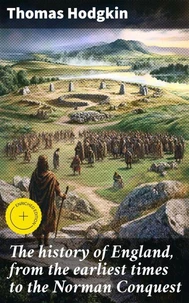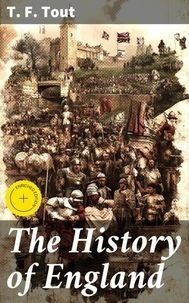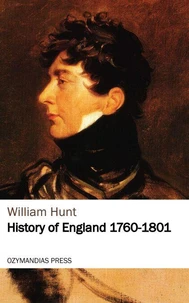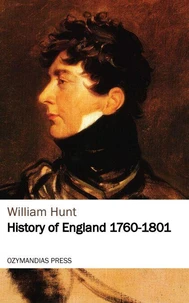The English Church in the Middle Ages. Unveiling the Religious Influence in Medieval England
Par :Formats :
Disponible dans votre compte client Decitre ou Furet du Nord dès validation de votre commande. Le format ePub est :
- Compatible avec une lecture sur My Vivlio (smartphone, tablette, ordinateur)
- Compatible avec une lecture sur liseuses Vivlio
- Pour les liseuses autres que Vivlio, vous devez utiliser le logiciel Adobe Digital Edition. Non compatible avec la lecture sur les liseuses Kindle, Remarkable et Sony
 , qui est-ce ?
, qui est-ce ?Notre partenaire de plateforme de lecture numérique où vous retrouverez l'ensemble de vos ebooks gratuitement
Pour en savoir plus sur nos ebooks, consultez notre aide en ligne ici
- Nombre de pages237
- FormatePub
- ISBN406-4-06-615872-9
- EAN4064066158729
- Date de parution18/12/2019
- Protection num.Digital Watermarking
- Taille616 Ko
- Infos supplémentairesepub
- ÉditeurGOOD PRESS
Résumé
In "The English Church in the Middle Ages, " William Hunt presents a comprehensive exploration of the intricate relationships between the church, society, and politics during a pivotal period in English history. The narrative combines meticulous historical research with lucid prose, inviting readers into the complex interplay of faith, power, and culture that characterized the Middle Ages. Hunt'Äôs analytical approach situates the church within broader socio-political movements, shedding light on its role in shaping national identity, law, and morality.
This book stands out not only for its scholarly rigor but also for its engaging style, making it accessible to both academic and general audiences interested in ecclesiastical history. William Hunt, a notable historian of the late 19th century, was profoundly influenced by the tumultuous backdrop of his era, marked by the rise of secularism and the questioning of traditional institutions. His extensive academic training, coupled with a keen interest in medieval studies, guided him in synthesizing diverse historical sources and perspectives.
This intellectual endeavor reflects Hunt'Äôs commitment to understanding the church's enduring legacy in England and its relevance to contemporary society. This book is highly recommended for anyone seeking to grasp the multifaceted nature of medieval English society. It serves as an essential resource for students of history, theology, and sociology alike, providing invaluable insights into how the church shaped the very fabric of medieval life and continues to echo through subsequent eras.
This book stands out not only for its scholarly rigor but also for its engaging style, making it accessible to both academic and general audiences interested in ecclesiastical history. William Hunt, a notable historian of the late 19th century, was profoundly influenced by the tumultuous backdrop of his era, marked by the rise of secularism and the questioning of traditional institutions. His extensive academic training, coupled with a keen interest in medieval studies, guided him in synthesizing diverse historical sources and perspectives.
This intellectual endeavor reflects Hunt'Äôs commitment to understanding the church's enduring legacy in England and its relevance to contemporary society. This book is highly recommended for anyone seeking to grasp the multifaceted nature of medieval English society. It serves as an essential resource for students of history, theology, and sociology alike, providing invaluable insights into how the church shaped the very fabric of medieval life and continues to echo through subsequent eras.
In "The English Church in the Middle Ages, " William Hunt presents a comprehensive exploration of the intricate relationships between the church, society, and politics during a pivotal period in English history. The narrative combines meticulous historical research with lucid prose, inviting readers into the complex interplay of faith, power, and culture that characterized the Middle Ages. Hunt'Äôs analytical approach situates the church within broader socio-political movements, shedding light on its role in shaping national identity, law, and morality.
This book stands out not only for its scholarly rigor but also for its engaging style, making it accessible to both academic and general audiences interested in ecclesiastical history. William Hunt, a notable historian of the late 19th century, was profoundly influenced by the tumultuous backdrop of his era, marked by the rise of secularism and the questioning of traditional institutions. His extensive academic training, coupled with a keen interest in medieval studies, guided him in synthesizing diverse historical sources and perspectives.
This intellectual endeavor reflects Hunt'Äôs commitment to understanding the church's enduring legacy in England and its relevance to contemporary society. This book is highly recommended for anyone seeking to grasp the multifaceted nature of medieval English society. It serves as an essential resource for students of history, theology, and sociology alike, providing invaluable insights into how the church shaped the very fabric of medieval life and continues to echo through subsequent eras.
This book stands out not only for its scholarly rigor but also for its engaging style, making it accessible to both academic and general audiences interested in ecclesiastical history. William Hunt, a notable historian of the late 19th century, was profoundly influenced by the tumultuous backdrop of his era, marked by the rise of secularism and the questioning of traditional institutions. His extensive academic training, coupled with a keen interest in medieval studies, guided him in synthesizing diverse historical sources and perspectives.
This intellectual endeavor reflects Hunt'Äôs commitment to understanding the church's enduring legacy in England and its relevance to contemporary society. This book is highly recommended for anyone seeking to grasp the multifaceted nature of medieval English society. It serves as an essential resource for students of history, theology, and sociology alike, providing invaluable insights into how the church shaped the very fabric of medieval life and continues to echo through subsequent eras.






